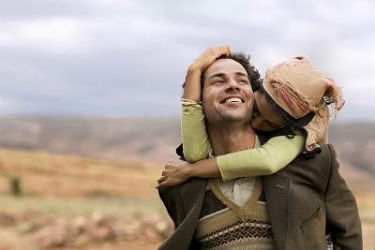Festivali CANNES 2011
With 'The Source,' Radu Mihaileanu
Looks at the Battle of the Sexes
|
CANNES, FRANCE — Radu Mihaileanu, who made a movie about an Ethiopian orphan in Israel and one about Russian musicians who perform, under false pretenses, in Paris, set his new film, "The Source," in the Atlas Mountains of Morocco. The dramatic comedy, which is in competition at the Cannes International Film Festival, will probably shed a little sunshine on a festival laden by dark themes. "I've always had a passion for travel, and each film I've made has been a chance to discover another language and culture," said Mr. Mihaileanu, 53, a Jewish Romanian who lives in Paris. "Filming this story, close up, was a way of getting inside a whole world." "The Source" is the story of women, young and old, who fetch water far from their arid mountain village, while their men sit and watch the world go by. Frustrated by this, a young bride, played by the French-Algerian actress Leila Bekhti, works on her entourage, and urges the other women to strike: No more sex until their men go to work. Mr. Mihaileanu noted that the release of his film coincides with the massive protests of the Arab Spring. "Revolution isn't just about the political movement on the streets," he said, "but how things are at home — and how customs and attitudes need to be shaken up. To have real social equality, democracy has to happen in the home. This is where it starts, and this was my pleasure making the film — getting inside another world." This modern "Lysistrata" has strong, beautiful women singing, dancing and suffering. For they are punished for their audacity: Leila, the bride who may be sterile, risks becoming an outcast and being replaced; another woman is beaten by her husband in earshot of the entire family, punished for her disobedience. The director said he wrote the part of Leila for Ms. Bekhti, his heroine. In describing the role to her, he said: "I told her, 'You are a contemporary Joan of Arc; you set off a revolutionary movement, about love and women's place in the world." But "The Source" is also a choral movie of women's voices, shot in Arabic in a small hamlet with a handheld camera. "All my characters are important," Mr. Mihaileanu said. "When I write, I write them all in. Then I have to shorten and focus." Hafsia Herzi, a French actress, plays young Esmeralda, a romantic who suffers from the strike. The Palestinian actress Hiam Abbass plays Leila's mother-in-law, a bitter woman who wears her own scars in secret. "She's a magnificent actress," Mr. Mihaileanu said. "I let her choose her part, and she wanted to play an unsympathetic character for a change." He said he felt a great sense of liberty directing the movie, even though it was filmed in Darija, a Moroccan dialect that he does not master. "I love the melodious sound of it," he continued, "and so much happens through music and dance. I made 'Live and Become' with characters who spoke Amharic and Hebrew, and in 'The Concert' the musicians speak Russian." "I don't speak Arabic, but I don't speak Russian or Hebrew either, and that didn't keep me from making my two earlier films." |
He added: "Ever since I escaped from Ceausescu's Romania, it has been my pleasure to do just what I choose. And this story is important to me. It's about aridity, arid hearts, and finding the link to get the flow."
Mr. Mihaileanu, who started out acting in a Yiddish theater in Bucharest, left Romania at 22 when he went to Israel for a few weeks. He had a supportive family: His father was a journalist, his mother an editor. "My father was in love with French literature," he said, "a cultural editor. My mother published children's' books and gave us a love of stories and legends. All their friends were poets and painters, big talkers and big travelers. Even though they couldn't travel." He moved on to Paris in 1980, where he graduated from the film academy IDHEC, and worked first on Volker Schlöndorff's "Swann in Love," then as an assistant to the director Marco Ferreri in the 1980s. "Ferreri said it first: 'Le futur est femme.' Woman is the future of man. He made a movie with that title and I thought of him when I started on 'The Source"' he said. Before filming this movie, Mr. Mihaileanu moved into a small hamlet outside Marrakesh and started to interview women in the valley. "It took me three months to prepare, from July to September 2009, and three months to shoot. The village had just gotten water themselves piped in only four years ago, so they got the drift of the story." It was during the interviews that "I met some of these characters and cast them in the movie," he said. "They are beautiful and I feel like saying, listen to these women, look at their beauty. They are luminous." About a dozen of the villagers who participated in the movie will be coming to Cannes to attend the screening at the Palais on Saturday. "They are the stars. They welcomed us so beautifully. They have never left their village. It will be a magnificent evening." A version of this article appeared in print on May 17, 2011, in The International Herald Tribune with the headline: With 'The Source,' Radu Mihaileanu Looks at the Battle of the Sexes Joan DUPONT |


